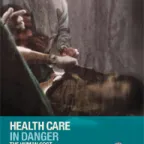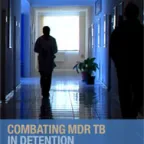Health care in danger: The human cost
The law says hospitals, ambulances and health-care workers must be protected and should never be targeted as they carry out their regular duties. This is often far from the reality. Worldwide, the …
The law says hospitals, ambulances and health-care workers must be protected and should never be targeted as they carry out their regular duties. This is often far from the reality. Worldwide, the …

Multi-drug resistant TB is spreading at alarming rates around the world, particularly in much of the former Soviet Union. This deadly disease is particularly virulent in places of detention. But in …

The 12th meeting of States Parties to the Convention on the Prohibition of Anti-Personnel Mines took place on 3-7 December 2012 in Geneva. During this event, the ICRC took the opportunity to …

At what point does violence become an armed conflict? What difference does it make to those involved in or affected by that violence? The distinction matters because how the situation is …
Discussions on Strengthening Compliance with International Humanitarian Law (IHL), Geneva, 8/9 November 2012 …
Hundreds of thousands of Central Americans risk kidnap, robbery, rape and misfortune every year to seek a better life up north. Some reach their goal, others fall off trains and lose their limbs. …

WORKING GROUP MEETING ON STRENGTHENING COMPLIANCE WITH IHL November 8 and 9, 2012 BACKGROUND DOCUMENT GENEVA, OCTOBER 2012 THE PURPOSE OF THIS DOCUMENT IS TO FACILITATE DEBATE AT THE WORKING GROUP …
Table seeking to provide the war crimes over which the International Criminal Court (ICC) has jurisdiction, together with the definition of such offences as found in other sources of international …
During the past ten years there has been much discussion and analysis of so called "incapacitating chemical agents" and of the use of these toxic chemicals as weapons for law enforcement. The ICRC …
Try one of the following resources:
Created in 1863, the ICRC library, alongside the ICRC archives, provides an indispensable documentary reference on the organization itself and international humanitarian law.
International humanitarian law is based on a number of treaties, in particular the Geneva Conventions of 1949 and their Additional Protocols, and a series of other instruments.
Customary international humanitarian law consists of rules that come from "a general practice accepted as law" and that exist independent of treaty law.